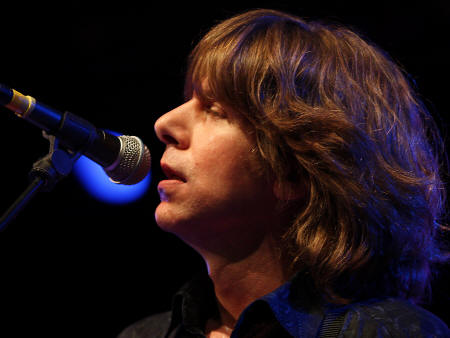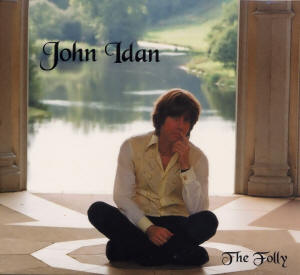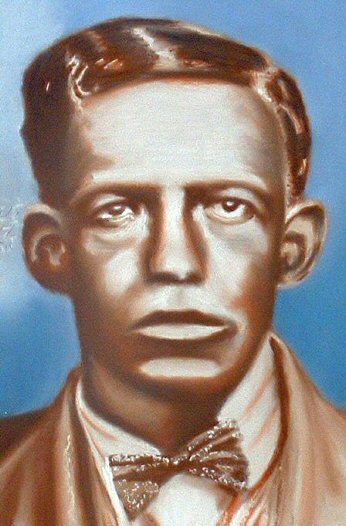|
The
Yardbirds played the
Colne Great British R&B
Festival on Saturday, 23rd August 2008.
John Idan, their lead vocalist and bass guitarist, who recently
issued a solo album 'The Folly', gave an exclusive interview to Alan
White of earlyblues.com. At the time of the interview, John
had decided to leave the Yardbirds at the end of the year, so here we
are in the transitional period between the pioneering 'career' forming
blues-based band and a new venture enabling John to put his own music
forward.
 John, thank you for
sparing the time. John, thank you for
sparing the time.
What were the main
influences in the making of your new solo album The Folly?
For a long time I didnít think I could write songs. Iíd been playing
music for most of my life and been inspired by greatness. So you get a
bit, ďoh gosh, am I ever going to be on that sort of levelĒ, that you
think you have to be at. And of course you hear stuff and go, ďOh
thatís not very good by comparison.Ē, so you have a stab at it. Jim
helped me out a lot with my writing, he egged me on. Weíd just made
Birdland for the Yardbirds. Writing a Yardbirds song was really
difficult, Jim being better at it than I, but I made contributions and
started to feel, ďYes, Iíve got something to sayĒ, but I probably canít
say it in the context of the Yardbird mould, so I started to put in my
own influences of things that I liked, and felt, that Iíve just got to
get my own ideas out there. It was really just like, well Iím a man now,
Iíve got to say what Iím about and not be scared.
And you played all the
instruments yourself? What was the most challenging part of this
process and would you do it again?
Definitely! Iím doing it again now. I had about 30 songs for the
album, well 30 ideas, so whatís left isnít leftovers, itís good
material, and Iím writing some more stuff to augment it. The most
challenging bit was most definitely the drumming, being all on tape. But
the most challenging thing about the album was to actually make it sound
like a group, and not to make it sound like some guy in his bedroom.
Also using real instruments, a real drum kit, a Hammond organ, loud
guitars, acoustic guitars. The way I did it was to routine a song up on
the acoustic guitar and I might be playing with a little click track and
Iíd go, ďOh, as soon as it gets to this section, I want to naturally
speed up and I want the song to liftĒ, so Iíd increase the tempo by 2,
say, for the chorus in a nice gradual fashion and Iíd lay that template
down on the tape and then play along to this sped up and slowed down
template. So maybe after that chorus the tempo diminishes back to where
it was at the beginning of the song, the way a band would naturally find
the inflection. It took time, a long time, to get it right.
How long?
Oh, to template a song, it could take almost all day, with trial and
error, remembering all those swells.
The Folly has a mixture of
musical styles, which are you most comfortable with and which excites
you the most?
Well, I purposefully left off trying to do any blues on it, simply
because Iíd been known as a blues guitar player in Jimís earlier bands,
and then of course with the Yardbirds thing, I didnít want to do
anything too Yardbirdy either. So I thought, musical influences should
come more from my upbringing. Probably the soul stuff is what gets me
the best, because my mum was a big soul fan.
Iíve read a report of the
album which describes it as having Ďa 70s feelí Do you agree with this
and think it possibly could?
It possibly could. Itís recorded on analogue equipment which was made
in the late 70s.
So it wasnít intentional?
Well, no, it probably was to a certain degree. I tried to make some
things sound like the 60s as far as the song writing goes. So
everything is kind of retro feel, because it is the kind of music that I
like.
Do you think the album
particularly appeals to those of a certain age?
Well, yes. Some people have also said that people who like the Isley
Brothers will also dig this. But the more young people I come across
who are actually going ďgosh, oh all those old bands, they knew how to
playĒ. So we were listening to my friends, who are huge Buffalo
Springfield fans, and they were like 22. I told Dewey Martin about that
when I met him in LA. I said ďIíve got friends who are 22 and
listening to your old records all the time!Ē It should cut across the
board, even Amy Winehouse is cutting retro style record.
What are your musical
memories of growing up in Detroit?
The Radio as a kid for sure, CKLW from Canada came across to Detroit, so
the top 40 from that. Just fantastic songs, all the time. Soul,
Motown, my mom was a big James Brown and Ray Charles fan.
What impressed you
musically when you first moved to London?
What impressed me the most, and was a good break for me, was that
Jim and Top Topham, whose band I had joined, were able to play 4 or 5
nights a week around London, so you met people and you got to play.
Back in Detroit, weíd get a three night stint over a weekend, twice a
month, so we were playing 6 shows a month, but by the time I was 24, I
was playing 20 shows a month just in London, which was great.
Who are your favourite
artists?
Lots. Iíve been listening to Jerry Butler all the time now. His
voice just knocks me out. I really like Harry Nilsson as well. As for
guitar players, there are so many, I like Earl Hooker, for blues.
Who has influenced you the
most?
Funnily enough, I would have to say, probably George Harrison
influenced me the most. Throughout time, the Beatles, and their
influence. More recently Curtis Mayfield influences me a lot. I like
Curtisí social messages and I like Georgeís social messages on a
spiritual level, so Iíve incorporated some of my spiritual beliefs,
hopefully without being too preachy. Just a flavour, but also a little
bit more than a hint of where Iím at. Sometimes Iíve got a bit of a
pointed stick in my hand, because sometimes it needs that.
What first attracted you
to the Blues?
The Yardbirds, funnily enough. My older brothers were listening to
heavy metal music, Deep Purple, Steppenwolf and then we got a Yardbirds
album, and I was like ďwow, this is likeÖmore primitive, heavy, but
primitive in its approachĒ and then of course I discovered all those
guitar players, and John Mayallís records pointed me to the black
players, because theyíd always say who the writers were, Otis Rush,
Albert King and then Iíd buy their albums. I even met Albert King, I
met a lot of the blues artists over the years.
Alan: Thatís something weíve suffered from over here. We werenít able
to see a lot of the old guys. I saw Muddy Waters once and that was a
really rare treat.
I saw Muddy in 78 or 79.
Alan: I saw him in 71 in Mothers Club, a small blues club in Birmingham.
How do you think the Blues
has influenced you?
The blues has definitely influenced me and also black people in general
in America. I grew up in an area that was about 75% black when I was in
elementary school. So their whole approach to lifeÖ.itís not totally
dissimilar, but it is a different social set-up. So witnessing that and
hearing the blues at a pretty young age, first with Ray Charles and my
mother, but then hard blues in my teens. Oh, the power of these men and
women and the fantastic emotion coming out of them, and youíd almost
say, well, thatís almost beyond me. And then we started playing blues
and one day I tried to sing ďI Canít Quit You BabeĒ and, all of a
sudden, I did it (sings)Ö like Otis Rush. And I thought, wow, I never
thought I could sing like that! Not that Iím a patch on Otis.
Do you listen to much
blues music?
Not as much as I used to. I listen to Howlin Wolf. His band was
my favourite band, because theyíre all crazy maniacs, theyíre all
playing with 5 different things going on. Thatís beautiful blues.
How healthy do you think
the blues scene is in the UK compared with the US?
Well this is a question, Iím not sure Iím able to answer. It has
changed. Here we are playing as the Yardbirds and I even wonder if we
should be on blues festivals, because primarily we are a popular rock
group. There is always blues involved in it but we are not a 12 bar
blues band. When we go around, and we played the blues festival
circuits in Canada last year, and Robin Trower was on the bill with his
sort of Hendrix thing and itís more sort of cosmic blues. There isnít
as much real stuff out there the real guys are fading away now.
What do you see for the
future of blues music?
If I ever do a blues album, which Iíd hope to do, I actually want to
go back and try and record a superb low-fi funky blues album, because I
donít actually like to hear the blues in a modern way. I donít want to
hear the bass so damn loud. I want to hear a balance engineer, who
knows just how heís going to put the microphone by the piano, so itís
just the right amount of high hats coming through.
Do you have many of your
self-penned songs in the usual Yardbirds set?
There arenít any at the moment. Thereís one song on the Folly album
called ďWhen You Were The OneĒ which was actually written with Gypie
Mayo and the Yardbirds had done an arrangement on it. I finished the
song and wrote all the words, so I gave the band its arrangement
credits, but it was a song that never manifested itself, although I
thought it was a good idea. Itís probably the most Yardbirdy type of
number on there.
Do you plan to do a solo
tour?
Yes, definitely. Iím working on a band right now. Finding a
drummer is the biggest problem. I did an album launch gig and the
players I had were excellent, but they were kind of helping out, so
finding a permanent band is going to be the next thing to do.
Are you planning to
release more solo albums?
Yes, the material is there, so I hope the next one will be out this time
next year. Letís see how this one runs its course. It might take the
second one to kick start this one a little bit more.
What do you think of the
future of live music in this digital age, with so much downloading going
on?
It seems like all the big bands are making their money from their gigs.
The downloading thing is, well, with some of the big bands giving their
albums away and they can afford to do thatÖI personally think ......if
this ever gets out to some of those people, I think theyíre full of
shit. If you can afford to do that, it doesnít make anybody elseís
world go round. Itís selfish, because most of the less well-known
musicians canít afford to do that.
John Idan, thank you very
much.
 John
Idan's debut solo album "The Folly", which includes the first single
"Banging My Head on the Wall" and the songs "We All Belong", "The Ballad
of Myself" and "A Long Time on This Road", a 20 page booklet with cool
photography, all the lyrics and a personal message from John, is
available now from iTunes or
Amazon or John's website
www.johnidan.com John
Idan's debut solo album "The Folly", which includes the first single
"Banging My Head on the Wall" and the songs "We All Belong", "The Ballad
of Myself" and "A Long Time on This Road", a 20 page booklet with cool
photography, all the lyrics and a personal message from John, is
available now from iTunes or
Amazon or John's website
www.johnidan.com
Return
to Blues Interviews List
Website, Photos & Text © Copyright 2001-2010 Alan
White. All Rights Reserved.
For further information please email:
alan.white@earlyblues.com
|









 John, thank you for
sparing the time.
John, thank you for
sparing the time.  John
Idan's debut solo album "The Folly", which includes the first single
"Banging My Head on the Wall" and the songs "We All Belong", "The Ballad
of Myself" and "A Long Time on This Road", a 20 page booklet with cool
photography, all the lyrics and a personal message from John, is
available now from
John
Idan's debut solo album "The Folly", which includes the first single
"Banging My Head on the Wall" and the songs "We All Belong", "The Ballad
of Myself" and "A Long Time on This Road", a 20 page booklet with cool
photography, all the lyrics and a personal message from John, is
available now from